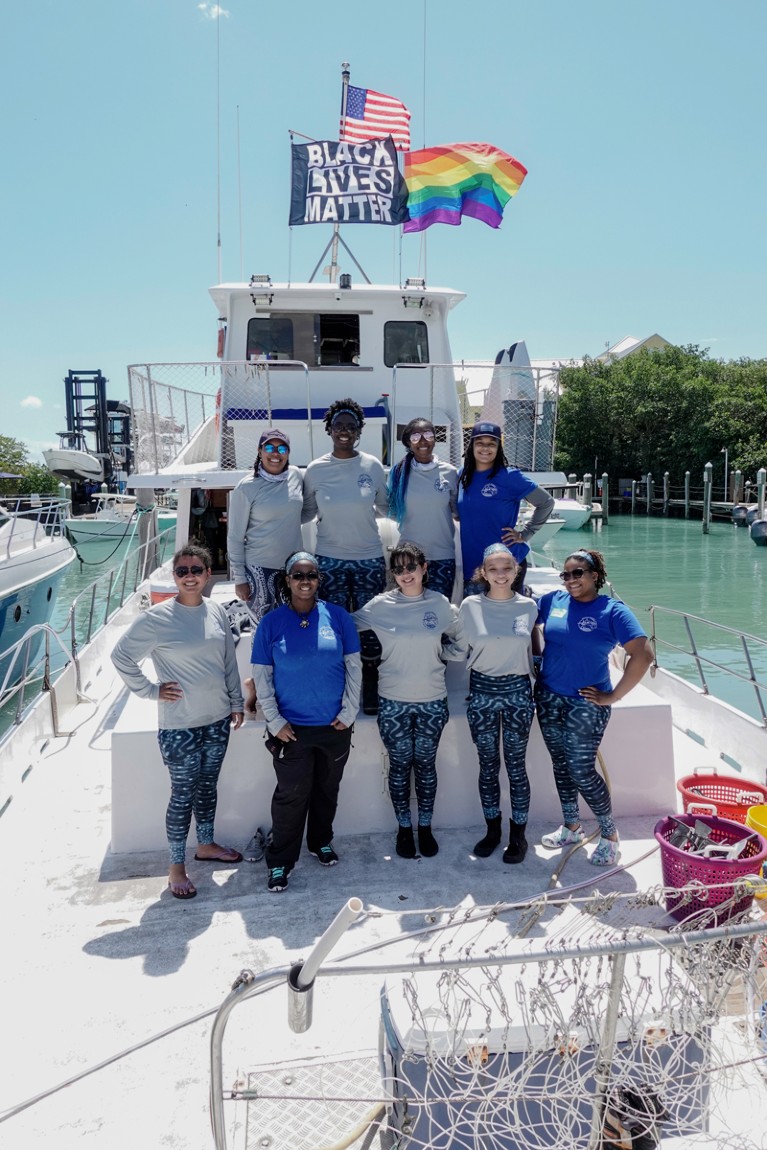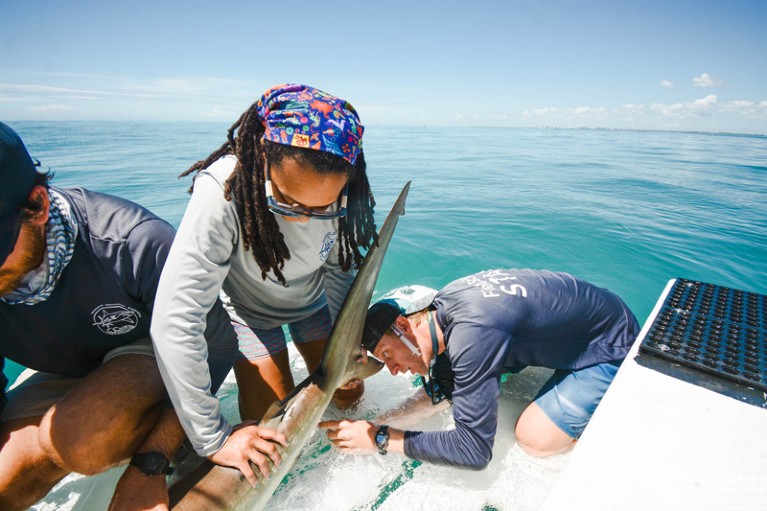Growing up in the forests of Chicago, Illinois, and the deserts of Phoenix, Arizona, Jaida Elcock never had much access to the ocean — and was even afraid of sharks. But the more she learnt on TV documentaries, the more she realized that we should be advocating for their conservation. “I really don’t want to know what an ocean without sharks looks like,” she says.
Having earnt a biology degree at Northern Arizona University in Flagstaff, and worked her way up through various internships and laboratory technician positions, Elcock is now a graduate student based in Falmouth, Massachusetts, studying the movement ecology of basking sharks (Cetorhinus maximus). Along the way, she faced racism, sexism and discrimination, she says.
In 2020, the murder of George Floyd, a Black man, sparked civil unrest in the United States. On the same day as Floyd’s murder, a white dog walker falsely reported Black birdwatcher Christian Cooper after he asked her to put her dog on a lead. This inspired many Black naturalists, including Elcock, to speak out on social media about their right to exist and occupy outdoor spaces, she says. It also led to the #BlackInNature hashtag, through which Elcock started chatting with fellow shark researchers Amani Webber-Schultz, Jasmin Graham and Carlee Jackson-Bohannon.
Pleasantly surprised to realize there were other Black women working in shark science, the four came together and founded Minorities in Shark Sciences (MISS), registered in Bradenton, Florida. Its mission is to advance marine sciences by challenging the status quo of what people think a scientist looks like. MISS works to support under-represented and historically excluded communities to help them to feel confident and accepted in science by providing them with access to a community, knowledge and training opportunities. Five years later, the organization has around 400 members in more than 30 countries.
What was it like for you as a young Black shark scientist?
I got a lot of pushback for wanting to become a marine scientist. I was once told that I got my university scholarship because of affirmative action, not because I deserved it. People would say things like “Black people can’t swim. How are you going to work with sharks?”. These ridiculous stereotypes exist because of systemic racism that has led to a generational fear of water in a lot of Black communities, and that is not our fault. (When public swimming pools became popular in the United States in the 1920s and 30s, segregation meant that Black people had less access and so less opportunity to learn to swim.)
I was also told that, as a woman, I wouldn’t be strong enough to handle sharks and I should be in the kitchen or raising a family.

The Minorities in Shark Science team.Credit: Julia Wester, Field School
For many people, encountering racism and sexism is incredibly discouraging. Why would you want to start a career in which you might hear those things all the time? But I used this pushback as fuel. If you tell me I can’t do something because of a terrible and irrational reason that’s based in hate, racism and sexism, I’m going to say: ‘Okay, watch me’.
When we co-founded MISS, we wanted to create a community of people with shared experiences who would support each other, provide a safe space and create opportunities to help them further their careers. Breaking down the social and financial barriers to getting opportunities in the field of marine science was a key goal.
We launched on Juneteenth (19 June) 2020. This is a really important day for the Black community in the United States: it’s the day that the last enslaved people received word that they had been freed, two years after the Emancipation Proclamation, in which president Abraham Lincoln declared that all slaves in the Confederate states were now considered free. Launching on this day was a way of showing our dedication, support and pride in who we are.
Do you feel like the perception of what a shark scientist looks like is changing?
Yes, at least in the spaces I’m in. With MISS, we now have a community of minority scientists that people can contact when they want to highlight certain people in science, whether that’s for a TV show or a school talk.
TV production teams now have somewhere to go to when most shark scientists on their shows are white dudes and they want to highlight the amazing work of other scientists as well. That’s not to say that these white guys aren’t also good at their job, but we want to remind people that there are other scientists out there.
For younger people, seeing themselves represented is so important, and I think we’re seeing a shift. Young people are now more exposed than before to all these diverse people in science. Seeing someone else who looks like them doing it shows that it could be an option for them, too.
Do you see any parallels between the stereotypes of who can be a shark scientist and which of the 500 or so shark species typically get more attention, such as great white sharks (Carcharodon carcharias)?
On nature shows, you always see the same thing — great whites breaching — and that’s cool. But what about the swell shark (Cephaloscyllium ventriosum), which swallows seawater to prevent itself from getting eaten by predators? What about the pocket shark (Mollisquama parini) that spews bioluminescent goo out of a pocket behind its fins?
There are parallels with diversity in science, for sure. You often see this one type of scientist — in the same way you see this one type of shark — but there are so many other cool options. We can show appreciation for all these other sharks and shark scientists as well. The more diversity we have in people, the more diversity we’ll get in thought. That’s going to lead to more innovation, more discovery and better science as a whole.
How does MISS help its members?
We run webinars and pair people up with mentors to help them apply for funding opportunities, fellowship programmes or graduate school. We also fundraise and apply for grants to support marine scientists from minority groups. We also run collaborative working groups, opportunities such as shark-tagging workshops and our Diversifying Ocean Sciences programme, in which people can learn lab and fieldwork techniques.

Jaida Elcock handling a shark tail while at sea.Credit: Jackson Coles, Field School


